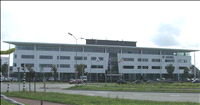Indonesia to provide tax incentives for small, fuel-efficient cars
07 Jun 2013
The Indonesian government has announced long-awaited tax exemptions for the production of low-cost, fuel efficient cars, a move that is expected to give a major boost to Japanese car manufacturers in Southeast Asia's largest economy.
Speaking to reporters the country's industry minister M S Hidayat said the new regulation was signed by president Susilo Bambang Yudhoyono on 23 May and ''from now on, low-cost green cars (LCGC) can be legally produced.''
"The current trend is green cars, which can reduce the consumption of fuel," the minister said.
The rules provide tax incentives for electric cars, hybrids, biofuel-based cars and compressed natural gas (CNG)-driven cars.
Under the new regulation, no luxury tax would be imposed on cars or station wagons with engine capacities of up to 1200cc and with a minimum fuel consumption of 20km per litre. It is also applicable to diesel or bio-diesel vehicles of up to 1500cc and a minimum fuel consumption of 20km per litre.
Currently, new cars are taxed in between 10 and 70 per cent in the country depending on their engine capacities.
The regulation requires that the eco-friendly cars should be manufactured in Indonesia with minimum specified local components to qualify for the tax exemption.
The Indonesian car industry is dominated by Japanese car manufacturers. But seeing the growth potential, others including US auto giants General Motors and Ford, and India's Tata Motors are also stepping up efforts to gain a foothold in the country's lucrative car market.
Last September, Tata Motors entered the Indonesian passenger and commercial vehicles segments by setting up a wholly-owned subsidiary PT Tata Motors Indonesia.
The new incentives are expected to be beneficial particularly to Toyota Motor Corp and Daihatsu Motor Co Ltd which have tie-ups with PT Astra International Tbk, Indonesia's largest car producer.
Last month, Daihatsu inaugurated a new plant in Karawang, West Java to produce 1000cc cars. The plant will make two models, its own Ayla and Toyota's Agya, hatchbacks developed to accommodate the government's LCGC policy.
It is expected that the tax incentives would lead to lower prices for small cars and help drive sales growth in the later half of the year.
Some analysts expect a 30-per cent jump in car production as a result of the new regulation.
Car sales in Indonesia hit an all-time high of 1.12 million in 2012, up 23 per cent compared with 0.89 million in 2011, after registering a 17-per cent rise in the previous year, according to Indonesian Automotive Industry Association (Gaikindo) data.
Car exports have shot up 60-per cent last year to 173,000 units, following a 26-per cent increase in the previous year.
Gaikindo expects car sales to remain flat this year due to cut in fuel subsidy, higher down payment requirements and weakening of Indonesian rupiah.
However, if the LCGC program is launched, car sales could go up to 1.2 million units in the current year, the association said.
It is estimated that Indonesia's annual auto sales could grow up to 1.5 million vehicles in the next three years, making the country Asia's fifth-largest auto hub after China, Japan, South Korea and India.
The country is poised to become a 3-million car market in the next decade, analysts say.






























